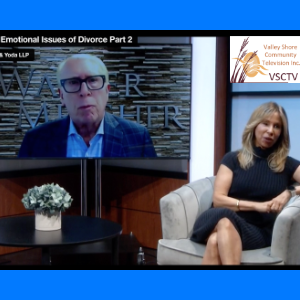
Navigating Emotional Issues of Divorce-Part 1
[Source: VSCTV]
Celebrity lawyer Peter M. Walzer, who is ranked as a best family law attorney in CA, discusses navigating the emotional issues of divorce on VSCTV.
Sylvia Guinan:
Hello and welcome to The Richness Of Show. Today we are going to be talking about Navigating the Emotional Issues of Divorce. I am so thrilled to have my very dear friend Peter Walzer on who is, I would say one of the most well-regarded top family law attorneys in Los Angeles, California. They do a lot of international work as well. He’s got a fantastic top family law firm that has a prestigious band 1 ranking for 7 years in a row. So with that being said, let me introduce you. Peter, thank you so much for joining us here today.
Peter Walzer:
Thank you for having me. I’m looking forward to chatting with you about this issue.
Sylvia Guinan:
Yeah, it’s an issue that unfortunately affects so many, and you and I always talk about life is about how we decide to think about things and that really dictates how we will navigate through difficult, challenging situations.
And I would love if you can share just a little bit, I mean with your vast experience of helping people navigate divorce, what are some of the things that you see that are a little bit unique but that have helped people navigate this awful messy process in a more peaceful way?
Navigating Emotions in Divorce
Peter Walzer:
So for me, I’ve been in a divorce lawyer, 42 years, but I learned the most by going through my own divorce. And I realized that when you’re going through it, you’ll look at it completely different than your professionals. You’re in the middle of an emotional maelstrom. It’s coming at you in various different ways. And even if you know all the technical aspects of it, you’re blindsided by these emotions.
Sylvia Guinan:
And the emotions are difficult. And I’m a big believer, I know that we have many, many different emotions, but the two ruling emotions really that we have are love and fear. And I think that the most difficult thing when we’re helping people navigate divorce is that the love that they had is essentially lost. And fear is at an all-time heightened level because there’s so much uncertainty financially and also with the family. So when you’re helping somebody navigate this process, how do you help them navigate those emotions?
The Five Stages of Grief
Peter Walzer:
So everybody’s different. And I really found for me, the model that I used was based on five stages of grief. And it wasn’t that they happened in any particular order or they even happened at all the same time, but it was a way to separate me from my emotions. And the stages that are outlined are denial, anger, bargaining, depression, and acceptance.
So what is it? Denial. This really isn’t happening to me. It can’t happen to me. It shouldn’t happen to me. Maybe we could get back together. You just go into a shell and you can’t really talk to anybody about it. You can’t really deal with it. That can last days, months, years, any number of time, but you just can’t get your head around it. You can’t do anything. You’re frozen. So what do you do?
And then at some point, the anger sets in, you’re resentful, why did you do this to me? How could this happen to me? You lose faith. You don’t know how to deal with it, and it’s coming at the same time. Now, denial and anger could be happening at the same time.
Then bargaining, if only I had done something different, how could I? It’s my fault. I should have, could have, would have. If it hadn’t happened this way or circumstances had been different, it would’ve been different. And then there’s the depression. You’re sad, you’re unhappy, you’re in despair. Again, it’s an overlay. They don’t come in any particular order. At some point, you’ve got to get to the point where you accept it. Some people never accept it. They’re living in the past 20, 30 years later. They’re still in the middle of their emotions, but a healthy person will accept it.
And to me, the key to acceptance is taking personal responsibility. Not that it’s my fault, but I can’t control somebody else, all I can control is myself and I’m going to deal with that. What do you think, Sylvia?
Sylvia Guinan:
Yeah, no, I totally agree. I mean, I think you brought up a lot of really good points. And the way that I see it too as I’m helping somebody navigate divorce is I think many times you see them get a little disappointed or they’ll say, “Oh, I am having such a bad day and I’m so disappointed because I was doing so much better.” And I think you’re right. I think it’s so important to remind people that any loss or major change like that, you’re going to be navigating different stages. And so I often give them the analogy. I say, it’s almost like parking a car. You don’t necessarily get into the ideal spot right away. Sometimes you have to parallel back in, sometimes you get out, sometimes you have to turn the wheel. So it’s not a straight trajectory, I think it’s like anything we have to learn to do that.
And in my experience, and I think what I love about you and makes you so unique is that you do recognize that side, right? There’s a lot of good matrimonial attorneys, but to me, what makes a matrimonial attorney exceptional is being able to navigate the emotional side of the divorce. And again, I love the way that you do that. And when did you first really start focusing on that?
Accepting the Emotions of Divorce
Peter Walzer:
Like I said, when I went through my own divorce and I had kids and all that, it’s like I was afraid… Like you said, you’re afraid of not only being alone, but being financially, not having money, splitting what you have, seeing your children half the time.
I think the main one is hurting your children. It’s like that’s something you can’t prevent. You can rationalize it. You can say, “Oh, the children are going to be fine.” But in reality, children like having an intact family and having a divided a split family, it’s hard. Even if you get along. You’re seeing your children half the time, you’re going to have half the amount of money. You may be paying support, you may be dependent on somebody else. All these fears that you have are legitimate. And I think part of what’s the solution to this, I think one of the solutions is accepting all these emotions, not judging yourself for being afraid, insecure, angry. It’s acceptance of them.
Also, I’m a great believer in exercise, getting lots of exercise and getting your frustrations out, whether you’re a tennis player or a runner or a gym rat or whatever, or a walker- take up exercise. Another is getting professional help. A financial planner is a must. A custody coach may be helpful. And this is in addition to your attorney. A good attorney is helpful. People that will support you and assist you through the process.
Sylvia Guinan:
No, those are great points. And to me, and I think you touched upon it, right? Denial. And I wrote my book, The Richness Of Divorce, and in The Richness Of Divorce I talk about chapter one is finding your truth. So it’s again, another way of looking at denial. And I think so often it’s so hard to come to that truth that you can no longer make it work and you need to move on. And I think that that’s the hardest step, but two, I think it’s so important when you come to that decision that it’s not going to work.
From your side of the table, once someone makes that decision, what is the next best logical step in terms of trying to map out a plan to move forward with unwinding their marriage?
Moving Forward After Divorce
Peter Walzer: Well, whatever plan you take, it’s best not to do it in anger. It’s to calm yourself down, get some assistance and seek professional help. Now, not everybody needs an attorney. Not everybody needs two attorneys. Some people can go to a mediator and resolve all their issues. Those are cases where there’s still trust, there’s knowledge of the financial situation, there’s cooperation in what’s in the best interest of the children. So mediation is a good option for many people, but some of us are not in that situation. There isn’t that trust. There are issues, there are legal issues relating to support, property, children, and that’s when you need to retain good legal counsel to advise you.
And whether you’re mediating or you’re litigating or whatever it is, it’s always good to spend some time consulting with good family law counsel to see what your options are and what the law is and what would happen if you ended up in court. So you can evaluate next steps. Many people choose, hire a lawyer and end up mediating their case after disclosures are done. Many people work it out themselves without attorneys, but it’s always good to know your options and not being afraid to spend some money to become knowledgeable yourself. Of course, reading books, looking on the internet, watching videos all good, but it’s always good to get local specialists in family law to advise you on the law of your state and even your locality, your county. It differs from county to county. At least, in California.
Sylvia Guinan:
Yeah, no, and I agree and I think it is taking baby steps, and I’m a big believer that knowledge is power. So if you are thinking about it too, I think sometimes I’ll advise a client to just go, let’s spend time speaking to a good family law attorney so that you can understand the process and what it might mean to you. I just think that that’s a great starting point.
And then you touched on, I think once you work through that stage, I think the next part, and I think you’re a thousand percent right, is the delivery.
How to Ask for Divorce
How do you articulate it if you’re the person that’s asking for the divorce? And if you’re not on the other side of it, still, how do you articulate the conversation wise? Because I think that that is going to drive the process because I think if you say to somebody, “This was all your fault. I’m so unhappy. My life is terrible.” Or if you say, “Listen, we had a great 15 years. We have a couple of beautiful children together and we are unfortunately not able to stand the same path anymore, but let’s do this with love and grace.” Again, I’d love to get your perspective on that.
But the other thing that I will say too is in my book I talk about how people feel so out of control. And I think even if your partner chooses to not navigate with love and grace, I think you could still try to keep your side of the fence with the whole mentality of navigating with love and grace and not going to their level.
Peter Walzer:
Yeah, I mean, you brought up a lot of points. How do you say it? It’s never easy. It’s like firing an employee. There’s no good way to say it and there’s no good way to hear it.
©2024 VSCTV. No claims made to copyrighted material. Aired 5/29/24.
5 More posts from Peter M. Walzer on Celebrity Divorce
More on High Net Worth Divorce

Dividing a Business in Divorce





